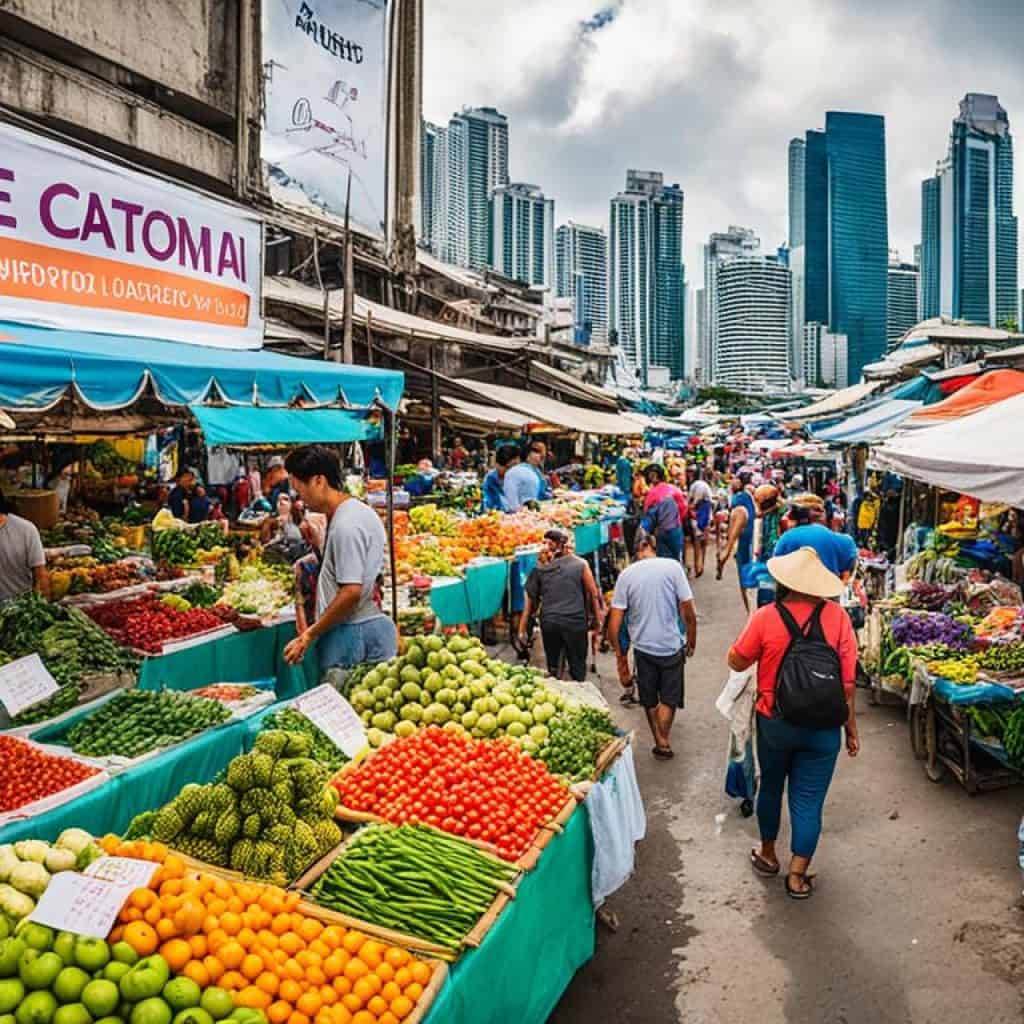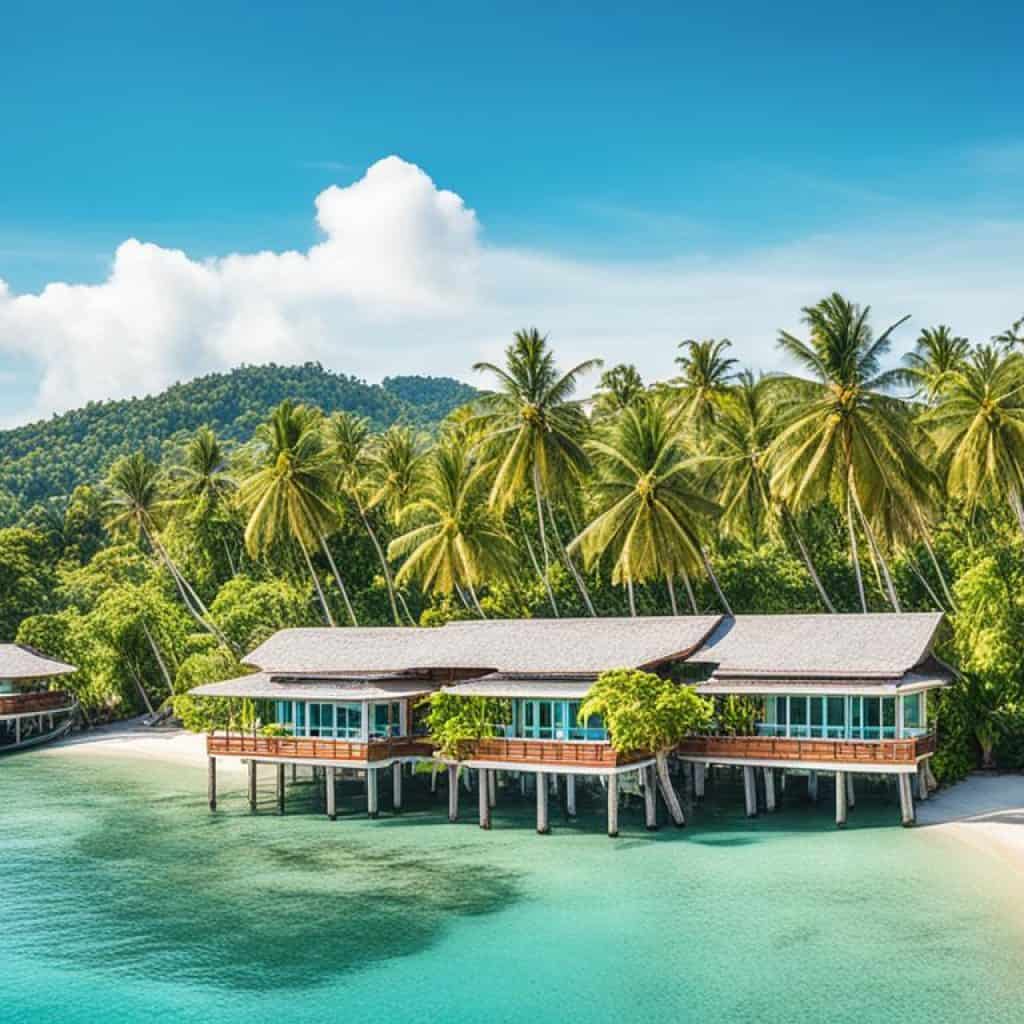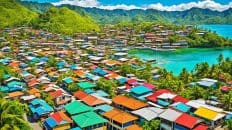Are you dreaming of a vibrant and affordable tropical lifestyle? Look no further than the Philippines. With over 7,000 beautiful islands, friendly locals, and a low cost of living, this Southeast Asian paradise has become a popular destination for expats seeking a new chapter in their lives. But what does it really mean to live as a Philippines expat? How do you navigate the expat community, embrace the local culture, and find the best places to live? In this guide, we will take you on a journey to discover the ins and outs of expat life in the Philippines.
Did you know that the Philippines is one of the most sought-after destinations for expats? Discover why so many foreigners choose to make this tropical paradise their home.
Why Choose the Philippines for Expat Life?
The Philippines offers a unique and exciting expat experience. The country is known for its friendly and English-speaking locals, stunning natural beauty, and low cost of living. The expat community in the Philippines is welcoming and diverse, providing many opportunities to connect with fellow expats through social events, clubs, and organizations.
The Philippine culture is rich and vibrant, combining traditional customs with modern influences. Living in the Philippines allows expats to immerse themselves in a tropical paradise while enjoying a laid-back and affordable lifestyle.
“The Philippines offers a unique and exciting expat experience. The country is known for its friendly and English-speaking locals, stunning natural beauty, and low cost of living.”
With its breathtaking landscapes, such as the famous white-sand beaches of Boracay and the stunning rice terraces of Banaue, the Philippines offers expats an opportunity to explore and discover the natural wonders of the archipelago. Whether it’s swimming with whale sharks in Oslob or hiking through the scenic mountains of Batanes, there is no shortage of adventure for expats living in the Philippines.
The Philippines expat community is a close-knit and supportive network, making it easy for newcomers to feel at home. Expats can find a variety of social clubs and organizations that cater to different interests and hobbies. From sports clubs and hobby groups to charity organizations and volunteer opportunities, there is always something to get involved in and meet like-minded individuals.
Another reason to choose the Philippines for expat life is the affordability. The cost of living in the Philippines is considerably lower compared to many Western countries. Housing, transportation, and food are all more affordable, allowing expats to enjoy a comfortable and relaxed lifestyle without breaking the bank.
Experience the Philippine Culture
Living in the Philippines provides expats with the unique opportunity to immerse themselves in the Philippine culture. From colorful festivals like the Ati-Atihan and Sinulog to traditional customs and practices like the Bayanihan spirit and respect for elders, expats can truly embrace the rich cultural heritage of the country.
The Philippines is also known for its delicious cuisine, which blends influences from various cultures such as Spanish, Chinese, and Malay. Expats can indulge in local favorites like adobo, sinigang, and lechon, as well as try out exotic fruits and street food delicacies.
Overall, the Philippines offers a vibrant and exciting expat life filled with warm hospitality, stunning natural beauty, and a rich cultural heritage. It is a destination that allows expats to enjoy a tropical paradise while experiencing a laid-back and affordable lifestyle.
Moving to the Philippines: What You Need to Know
Moving to the Philippines as an expat can be an exciting adventure, but it also requires careful planning and preparation. Before making the move, it is crucial to familiarize yourself with the visa requirements, healthcare system, and general living conditions in the country. This section will provide you with valuable information and tips to ensure a smooth transition to your new life in the Philippines.
Visa Requirements
When moving to the Philippines, expats need to understand the visa requirements to legally reside in the country. The Philippines offers various types of visas, including tourist visas, work visas, and retirement visas. It is essential to determine which visa category is suitable for your circumstances and comply with the necessary documentation and application process.
Healthcare System
Another crucial aspect to consider is the healthcare system in the Philippines. Familiarize yourself with the healthcare facilities in your chosen location and evaluate the availability of quality medical care. It is advisable to obtain international health insurance that covers medical expenses in the Philippines and consider emergency medical evacuation coverage.
General Living Conditions
Before moving, research and understand the general living conditions in the Philippines. Explore the cost of living, housing options, transportation, and local customs. Learning about the country’s culture and customs will help you adapt and integrate into the local community smoothly.

“Moving to the Philippines as an expat is an opportunity to embrace a new culture and experience a tropical paradise. With some careful planning and research, your transition can be a seamless and rewarding journey.” – Expat in the Philippines
By understanding the visa requirements, healthcare system, and general living conditions, you can ensure a successful move to the Philippines. Consulting with immigration specialists or lawyers, as well as connecting with expat communities, can provide valuable insights and support throughout your relocation. So, prepare yourself for an incredible journey and get ready to embrace the beauty and warmth of living abroad in the Philippines!
Navigating the Expat Community in the Philippines
The Philippines has a vibrant and active expat community, particularly in major cities like Manila and Cebu. If you’re living abroad in the Philippines, joining expat groups and social clubs can be a fantastic way to meet like-minded individuals and make new friends. The expat community in the Philippines is known for their warmth and inclusiveness, making it easy to connect with people from all walks of life.
Expat groups and social clubs in the Philippines organize a variety of activities and events, providing ample opportunities to socialize and have fun. From cultural outings and day trips to volunteer activities and language exchanges, there’s always something happening within the expat community. These events not only allow you to explore the local culture and immerse yourself in new experiences but also foster a sense of belonging and camaraderie among fellow expats.
In addition to in-person networking, online forums and social media groups are essential resources for expats looking to connect with others in the Philippines. These platforms provide spaces to exchange tips, information, and experiences related to expat life in the country. Whether you’re seeking advice on navigating the healthcare system, exploring the best local restaurants, or planning weekend getaways, the Philippines expat community is filled with individuals ready to offer insights and support.
Connecting with the expat community in the Philippines not only helps you forge strong friendships but also enables you to tap into a wealth of knowledge and experiences. Whether you’re a seasoned expat or just starting your journey in the Philippines, the support and guidance from fellow expats can be invaluable in making your stay in the country more fulfilling and enjoyable.
Benefits of Navigating the Expat Community in the Philippines
- Opportunity to meet like-minded individuals
- Engage in social and cultural activities
- Exchange tips, advice, and information
- Access to local insights and experiences
- Forge lasting friendships
| Pros | Cons |
|---|---|
| Opportunity to create a support network | Expats may feel overwhelmed initially |
| Access to local knowledge and experiences | Language and cultural barriers |
| Enhances social and cultural integration | Possibility of encountering conflicting opinions or viewpoints |
| Expands opportunities for friendship and companionship | Expats may experience cliques or exclusivity within the community |
By actively participating in the expat community and leveraging the resources available, you can enhance your living experience in the Philippines and create a strong support network. Remember, your journey as an expat in the Philippines is not just about the destination but the enriching connections you make along the way.
Embracing the Philippine Culture and Lifestyle
Living in the Philippines as an expat offers a unique opportunity to fully immerse yourself in the rich and diverse Philippine culture. From the moment you step foot in this vibrant country, you’ll be captivated by the warm hospitality and welcoming nature of the Filipino people.
The Philippines is renowned for its delicious cuisine that combines flavors from various influences, such as Spanish, Chinese, and Malay. Whether it’s indulging in mouthwatering adobo, savoring freshly caught seafood in Davao, or satisfying your sweet tooth with halo-halo, you’ll discover a world of culinary delights at every turn.
But the cultural experiences don’t stop at the dinner table. Throughout the year, the Philippines comes alive with colorful festivals that showcase the country’s rich history and traditions. From the grandeur of the Sinulog Festival in Cebu to the spectacular Parol Festival in Pampanga, these events offer a unique glimpse into the vibrant Filipino spirit.
“The Philippines provides a kaleidoscope of cultural experiences, where traditions meld with modernity. The warm smiles and open arms of the Filipino people make it easy for expats to feel at home, forging meaningful connections and immersing themselves in a true Filipino lifestyle.” – James Wilson, Expat Living Magazine
To truly embrace the Philippine culture and lifestyle, expats can participate in fiestas, which are joyous celebrations held in various regions. These events are filled with lively music, traditional dances, colorful costumes, and a strong sense of community. By joining in the festivities, expats gain a deeper understanding and appreciation for the cultural heritage of the Philippines.
For those seeking historical and architectural wonders, the Philippines offers countless sites to explore. From the UNESCO World Heritage-listed churches of Paoay and Miagao to the iconic Intramuros in Manila, history buffs will be enthralled by the rich tapestry of the past that is still present today.
The unique blend of natural beauty, warm hospitality, and vibrant culture makes living in the Philippines an unforgettable experience. By embracing the Philippine culture and lifestyle, expats can create lasting memories and forge connections that will enrich their lives in this tropical paradise.
Finding the Best Places to Live in the Philippines
When it comes to finding the best places to live in the Philippines, expats have a wide range of options to choose from. Whether you prefer a bustling city life or a laid-back beach town, the Philippines offers something for everyone.
Major Cities:
If you’re looking for modern amenities, international schools, and a vibrant city life, major cities like Manila, Cebu, and Davao are popular destinations for expats. These cities offer a wide range of housing options, from high-rise condominiums to gated communities. You’ll also find a variety of shopping malls, restaurants, and entertainment venues to keep you busy.
Beach Towns and Provinces:
If you prefer a more laid-back lifestyle, there are plenty of beautiful beach towns and provinces to consider. Places like Palawan, Bohol, and Siargao offer stunning natural beauty, pristine beaches, and a relaxed atmosphere. You can spend your days exploring hidden lagoons, diving in vibrant coral reefs, or simply lounging on the white sandy beaches.
To help you make an informed decision, here’s a table highlighting some key features of popular expat destinations in the Philippines:
| Destination | Advantages | Disadvantages |
|---|---|---|
| Manila | Modern amenities, international schools, diverse expat community | Traffic congestion, crowded city |
| Cebu | Beautiful beaches, vibrant city, affordable cost of living | Some areas prone to traffic and pollution |
| Davao | Clean and safe city, abundant nature, relaxed lifestyle | Less developed infrastructure compared to Manila and Cebu |
| Palawan | Untouched beauty, world-class diving, peaceful environment | Less accessibility to modern amenities |
| Bohol | Rich cultural heritage, spectacular Chocolate Hills, tranquil beaches | Infrastructure still developing in some areas |
| Siargao | Surfing paradise, pristine beaches, laid-back island vibes | Limited healthcare facilities, remote location |
Remember, each location in the Philippines has its own unique charm and attractions, so it’s important to visit and explore different areas before making a decision. Consider factors like climate, cost of living, healthcare facilities, and proximity to amenities that are important to you. Whether you choose a city or a beach town, living in the Philippines as an expat promises an exciting and rewarding experience.
Cost of Living as a Philippines Expat
Living in the Philippines as an expat comes with the distinct advantage of a low cost of living. When compared to many Western countries, the Philippines offers affordable options for housing, transportation, food, and entertainment, allowing expats to enjoy a comfortable lifestyle without breaking the bank.
The cost of living can vary depending on the location and lifestyle choices of the expat. On average, a single person can comfortably live on a monthly budget of $1000 – $1500 in the Philippines. This budget takes into account expenses such as rent, utilities, groceries, dining out, and healthcare. Of course, the cost of living may be higher or lower depending on personal preferences and the chosen location within the Philippines.
Expats are encouraged to create a detailed budget to plan their expenses and make the most of their resources. Consider factors such as the cost of housing, which can vary greatly between urban and rural areas. Utilities, including electricity, water, and internet, should also be accounted for. Grocery costs are typically affordable, especially if one is willing to explore local markets and street vendors. Dining out can range from inexpensive local eateries to more upscale international restaurants, allowing expats to indulge in a variety of cuisines.
It’s important to note that healthcare expenses should be factored into the budget. While healthcare in the Philippines is generally affordable, expats may want to consider health insurance to cover medical costs and provide peace of mind. Emergency medical evacuation coverage is also advisable for expats living in more remote areas.
Overall, the low cost of living in the Philippines makes it an attractive destination for expats looking to stretch their budget while enjoying a high quality of life.

Healthcare and Insurance for Expats in the Philippines
While major cities like Manila and Cebu have reputable hospitals and clinics, it is important to note that healthcare in more remote areas may not meet international standards. Therefore, it is highly recommended for expats to have international health insurance that covers medical expenses in the Philippines.
Before moving to the Philippines, it is advisable to have regular check-ups and vaccinations to ensure that you are in good health. Researching the local healthcare options and finding a trusted doctor or healthcare provider is also essential.
| Key Points: |
|---|
| 1. International health insurance: Obtain insurance coverage that includes medical expenses and emergency medical evacuation. |
| 2. Regular check-ups and vaccinations: Prioritize your health by scheduling regular check-ups and ensuring you are up to date on vaccinations. |
| 3. Research local healthcare options: Familiarize yourself with the healthcare facilities, doctors, and services available in your chosen location. |
Retiring in the Philippines
The Philippines is an ideal retirement destination for expats seeking a fulfilling and affordable lifestyle. With its stunning beaches, warm weather, and welcoming culture, it’s no wonder that many retirees choose to settle down in this tropical paradise.
As a retiree in the Philippines, you can enjoy a comfortable lifestyle on your pension or savings. The cost of living is relatively low, allowing you to stretch your budget without compromising on quality of life. Whether you prefer a tranquil beachside retreat or the energetic buzz of a city, the Philippines offers a diverse range of housing options to suit your preferences.

“Retire in the Philippines and experience a laid-back lifestyle, breathtaking natural scenery, and a warm and friendly community.”
The healthcare system in the Philippines is well-developed, with both private and public facilities available. As a retiree, you’ll have access to quality healthcare services at a fraction of the cost compared to many Western countries. It is advisable to secure comprehensive health insurance to cover medical expenses and ensure peace of mind during your retirement years.
Retirees in the Philippines can enjoy a range of leisure activities, from exploring the country’s rich history and culture to indulging in water sports and outdoor adventures. The Philippines is renowned for its vibrant festivals, mouthwatering cuisine, and diverse natural landscapes, offering endless opportunities for exploration and relaxation.
Retirement Visa
The SRRV program offers various options depending on your age and financial situation. Retirees can choose between depositing a specific amount in a Philippine bank, investing in approved properties, or proving a monthly pension. It is advisable to consult with a retirement specialist or financial advisor who can guide you through the visa application process and help you choose the best option for your circumstances.
| Benefits of the SRRV Program | Requirements |
|---|---|
| Multiple-entry privileges | Minimum age of 35 or 50, depending on the program |
| Tax-free remittance of pensions and annuities | Sufficient retirement funds or investable assets |
| Exemption from the exit clearance and re-entry permit | Affidavit of pension or retirement benefits |
| Discounts and benefits on travel, healthcare, and leisure | Medical clearance |
Retiring in the Philippines offers expats a fulfilling and enriching experience. You’ll be able to relax and enjoy the beautiful surroundings, develop close friendships with the friendly locals, and immerse yourself in the vibrant Filipino culture. With its affordable cost of living and numerous retirement benefits, the Philippines is an attractive destination for those seeking a rewarding retirement.
Educational Options in the Philippines for Expats
For expats living in the Philippines with children, finding a quality education that aligns with international standards is a top priority. Fortunately, there are several international schools in the country that cater to the needs of expat families, providing a multicultural environment and a diverse community of students from around the world.
These international schools in the Philippines offer a comprehensive curriculum that follows international standards, ensuring that students receive a well-rounded education. Whether you prefer a British, American, or International Baccalaureate program, there are schools that can accommodate your preferences.
When choosing an international school, it is important to consider various factors such as the school’s reputation, curriculum, extracurricular activities, and facilities. Visiting the schools and speaking with the faculty and staff can also provide valuable insights into the learning environment and teaching methodologies, helping you make an informed decision.
Here are some popular international schools in the Philippines:
- British School Manila: Located in Taguig City, Metro Manila, the British School Manila offers a British education to students from pre-school to high school. The school follows the British National Curriculum and provides a supportive learning environment.
- International School Manila: Situated in Makati City, Metro Manila, International School Manila offers an American-style education based on the International Baccalaureate program. The school focuses on interdisciplinary learning and encourages students to become lifelong learners.
- Brent International School: With campuses in Baguio, Subic Bay, and Manila, Brent International School provides an American-style education with a global perspective. The school offers a wide range of academic and extracurricular programs to foster students’ holistic development.
“Education is the most powerful weapon which you can use to change the world.” â Nelson Mandela
Choosing the right international school for your child is crucial to their educational journey and overall development. By considering the various options available and conducting thorough research, you can ensure that your child receives a high-quality education while living in the Philippines.
Transportation and Infrastructure in the Philippines
Living in the Philippines offers a unique transportation experience, with various options available for getting around the country. The most common mode of transportation in urban areas is the jeepney, a brightly colored and uniquely Filipino form of public transportation. Jeepneys are inexpensive and can take you to almost any destination within cities. For longer distances, buses and taxis are widely available.
The Philippines also has an extensive network of domestic airports, making air travel a convenient option for exploring different islands. The country’s major airlines offer frequent flights to popular tourist destinations, allowing you to easily discover the breathtaking natural landscapes and stunning beaches the Philippines is known for. Additionally, tricycles, motorized or pedal-powered three-wheeled vehicles, are commonly used for short trips in local communities.
When it comes to infrastructure, major cities like Manila and Cebu have well-developed road systems, modern bridges, and efficient public transportation. However, it is important to note that in more remote areas, infrastructure may be less developed and road conditions may not be as smooth. It is advisable to plan and research your routes beforehand, and to be prepared for possible delays or detours.
Overall, while there may be some challenges associated with transportation and infrastructure in the Philippines, the country offers a colorful and exciting way to get around and explore. Whether you’re hopping on a jeepney, taking a flight to an amazing island, or riding a tricycle through a local community, the transportation options in the Philippines will add to your unique expat experience in this tropical paradise.
FAQ
Why should I choose the Philippines for expat life?
The Philippines offers a vibrant and affordable tropical lifestyle, with friendly locals and a low cost of living. It is known for its stunning natural beauty, English-speaking locals, and a welcoming expat community.
What do I need to know before moving to the Philippines?
Before moving to the Philippines, it is important to research visa requirements, healthcare options, and general living conditions. Consult with an immigration specialist or lawyer to ensure a smooth transition.
How can I navigate the expat community in the Philippines?
The expat community in the Philippines is diverse and welcoming. Joining expat groups and social clubs, attending social events, and connecting through online forums can help you meet fellow expats and make new friends.
How can I embrace the Philippine culture and lifestyle as an expat?
You can immerse yourself in the Philippine culture by attending local festivals, trying traditional dance and music classes, exploring historical sites, and enjoying the warm hospitality of the locals.
What are the best places to live in the Philippines as an expat?
The Philippines offers a range of options for expats, including major cities like Manila and Cebu for a vibrant city life, as well as beautiful beach towns and provinces like Palawan and Bohol for a more laid-back lifestyle. Research and visit different areas to find your perfect location.
What is the cost of living like for expats in the Philippines?
The cost of living in the Philippines is generally low compared to Western countries. A single person can comfortably live on a monthly budget of $1000 – $1500, depending on location and lifestyle choices.
What healthcare and insurance options are available for expats in the Philippines?
The Philippines has a mix of public and private healthcare facilities. Expats are advised to have international health insurance that covers medical expenses and emergency medical evacuation. Research local healthcare options and find a trusted healthcare provider.
Is the Philippines a good place to retire as an expat?
What educational options are available for expat children in the Philippines?
There are several international schools in the Philippines that offer quality education following international curricula. Research and visit different schools to find the best fit for your child’s needs.
What is the transportation and infrastructure like in the Philippines?
The Philippines has various transportation options, including taxis, buses, jeepneys, and tricycles. Major cities have modern infrastructure, while more remote areas may have limited transportation facilities.


















Add comment